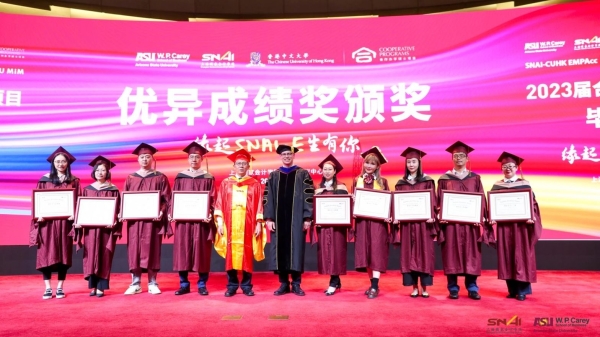ASU agribusiness professor’s research awarded for ‘Lasting Impact’

Ashok Mishra.
He changed agricultural policy around the world, initiated several governmentwide projects for the well-being of self-employed farm family businesses and has spoken before legislative and executive branches in Washington, D.C., and to policy-savvy audiences who have adopted or acknowledged his constructive perspective.
Along with his co-authorBarry Goodwin, associate professor in the Department of Agricultural and Resource Economics at North Carolina State University, who's the William Neal Reynolds Distinguished Professor, Arizona State University Agribusiness Professor Ashok Mishra published their research, “Farm Income Variability and the Supply of Off-Farm Labor,” in the American Journal of Agricultural Economics in 1997. The paper now has received the 2020 Publication of Lasting Impact award from the Agricultural Finance and Management section of the Agricultural and Applied Economics Association (AAEA).
The Publication of Lasting Impact award is granted to encourage excellence in publications in fields consistent with the Agricultural and Applied Economics Association. One award is given each year for a publication with the publication date falling at least 10 years before the year of recognition. Entries are judged based on the enduring quality of the publication to the profession. The award is made by the Agricultural Finance and Management section of the AAEA, and a committee of applied economists from the AAEA selects the article from all nominations.
The award is an important recognition for Mishra’s work that has been referenced more than 420 times in the literature.
“We are very excited and humbled to receive this award, and it’s an important milestone in our career,” said Mishra, who joined the Morrison School of Agribusiness at the W. P. Carey School of Business in July 2015. “We are happy to note that the work has set forth significant changes in agricultural policy in the U.S. and in other countries around the world.”
As the Marley Chair in Food Management at the Morrison School of Agribusiness, Mishra's research addresses food security, food value chains, household economics and agribusiness finance. Whether it’s how gender affects cropping decisions amid climate change or how hydroponics alters urban farming, he's always been fascinated by the economics of feeding people.
“ASU has become a launchpad for research that can make a difference,” Mishra said. By better understanding food systems and food security, he said, governments can enact better policies to ensure the population thrives.
Mishra’s research that was given the Publication of Lasting Impact award highlights the issue of income variability and how farm family members allocate their time in dual employment.
“When designing policies, policymakers must take into account total household income and total household net worth, not just farm income and farm net worth,” Mishra said. “As a result, policymakers have instituted total income and total net worth thresholds to receive government support.”
The agricultural income support program was enacted in 1933 to secure a stable supply of food and fiber for the American population. At the same time, the program was meant to provide financial assistance to self-employed farm businesses, farm people and rural areas.
“If policymakers chose to reduce farm income support, it could have several consequences,” Mishra said. “First, it could lead to food insecurity, higher food prices and lower farmland values. Lower farmland values could increase borrowing costs for farming businesses and total cost of farming and eventually affect agricultural value chains.”
This would kick in significant uncertainty in production quantity and prices and could lead to unpredictable income for farming businesses.
Unpredictable income might motivate farming families to reallocate their time in dual employment.
“Members work off the farm for more stable and higher incomes and fringe benefits such as health insurance and retirement benefits,” Mishra said. “This in turn may create labor shortages of both family and hired farmworkers if household members work in the nonfarm economy, and that could cause higher labor and production costs.”
The study shows that farm program payments could be counterproductive in the economic well-being of the farm household. Generous farm subsidies in the past seven decades have discouraged farmers and their spouses from working off the farm. The study highlights the importance of exploring the household model, thinking specifically about its application in contemporary agricultural policy analysis.
Before joining the W. P. Carey School in 2015, Mishra was the Donald E. Welge Endowed Professor at Louisiana State University. Before that, he spent a decade as an economist for the Economic Research Service at the U.S. Department of Agriculture.
He received his bachelor’s degree in agriculture and agricultural economics from the G.B. Pant University of Agriculture and Technology in India, his master’s degree in economics from the University of Aberdeen in the U.K. and his doctorate in economics from North Carolina State University.
Mishra has been commended for his research awards in applied economics and agribusiness, being named a fellow by the Western Agricultural Economics Association in 2020. He was also recognized as a fellow by the Northeastern Association of Agricultural Resource Economists in 2013.
More Business and entrepreneurship

New ASU certificate to address veteran underemployment
Veterans and military spouses bring a wealth of talent to the corporate world. Unfortunately, human resources and…

ASU China Executive MBA ranked No. 7 in world by Financial Times
In the 2024 Financial Times rankings for Executive MBA (EMBA) programs, Arizona State University's W. P. Carey School of Business…

ASU, Ghana partnership enhances supply chain practices in Africa
As a New American University, ASU defines the communities it serves as including both its backyard neighbors and colleagues…